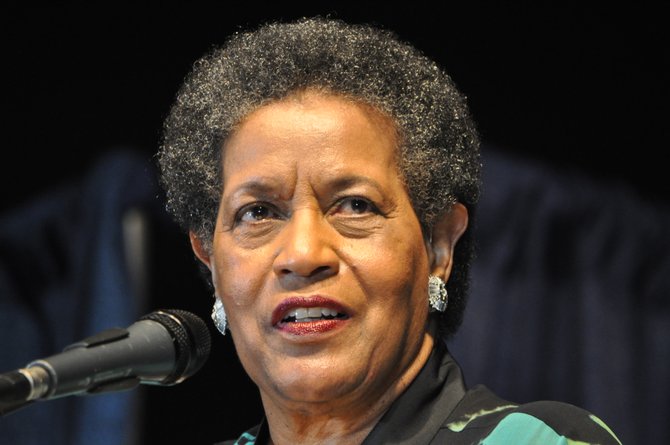Nearly 750 celebrants attended the Medgar Evers gala—a black-tie, $100-a-ticket affair held at the Jackson Convention Complex that featured several high-profile guests, including Evers' widow Myrlie Evers-Williams. Photo by Tyler Cleveland
Fifty years after the assassination of Medgar Evers, Mississippi Gov. Phil Bryant and civil-rights leader Jesse Jackson came together to celebrate Evers' life. If there was any doubt about the impact of his message of coexistence and social harmony, it was dispelled last night.
Nearly 750 celebrants attended the gala—a black-tie, $100-a-ticket affair held at the Jackson Convention Complex that featured several high-profile guests, including Evers' widow Myrlie Evers-Williams, NAACP Chairman Ben Jealous, legendary bluesman B.B. King and Vernon Jordan Jr., a former Bill Clinton adviser and a civil-rights champion.
The Alcorn State University male ensemble performed the Negro National Anthem to kick off the production before Evers-Williams gave the official welcome.
"I'm happy to see all of you here 50 years after Medgar's assassination," Evers-Williams said. "... He left us with memories, left us with courage, and he left us with the determination to continue the fight that he had started here in Mississippi. I'm so happy that we have so many in the audience that contributed to that struggle. We'll continue to work as Medgar worked, for the benefit of all. He knew what he was doing, he knew what the chances were (that) he would not survive. He does not in the physical, but his spirit survives and lives, and has led us toward the future."
Outgoing Jackson Mayor Harvey Johnson Jr. spoke next, and welcomed the audience—some of whom had traveled from as far away as Washington D.C., New York and California to attend—to the gala.
Johnson called events like Wednesday night's gala "crucial" to educating the youngest generation of Jackson's black citizens on the important role civil-rights leaders like Evers played.
"Although we have come a long way in terms of civil rights, there's still much work to be done," Johnson said. "Events like this one and others we've experienced this past week help to inspire our young people to continue the journey that Medgar started. ... Some of us, many people, have not considered the rugged path African Americans have had to travel in pursuit of economic, social and political empowerment. That is a journey that African Americans must continue, even today."
The presentation continued late into the evening. Highlights included performances by soul singer William Bell, gospel recording artist Tamela Mann and, of course, B.B. King, who closed out the night.
The Medgar and Myrlie Evers Foundation also gave one of its four inaugural Evers Justice Awards to Jordan, who, among other achievements, successfully sued the University of Georgia and forced the school to admit its first two black students in 1961. Jordan survived an assassination attempt in 1981. Other honorees were civil-rights activist Fannie Lou Hamer (posthumously), King and Clarion-Ledger investigative reporter Jerry Mitchell, who helped convince authorities to reopen cold cases from the civil-rights era.
The foundation bestowed its inaugural Evers Youth Justice Awards to Justin Harris of Blackburn Laboratory Middle School and Montavius Esco of Nichols Middle School.
Jordan also made a special presentation of a donation of $150,000 to the Medgar and Myrlie Evers Foundation.
Although recognized, special guests Jesse Jackson and the city of Jackson Mayor-elect Chokwe Lumumba did not speak at the event. Lumumba did, however, take a few minutes to comment from the red carpet.
"I'm very inspired by what Medgar did, and he helped to create a launching pad for what we are about to do in the city of Jackson," Lumumba said.
"The fact that so many of us are here today, and from so many different communities, is a tribute to what he was trying to achieve. He was trying to integrate restaurants and get some people to vote, and now we have all these people here, from all different walks, celebrating his life. It's a tremendous tribute to his resilience. He was in a place where he was lonely, in many instances and, I'm sure, often afraid. He lost his life, but only after he had already given it to the movement."


